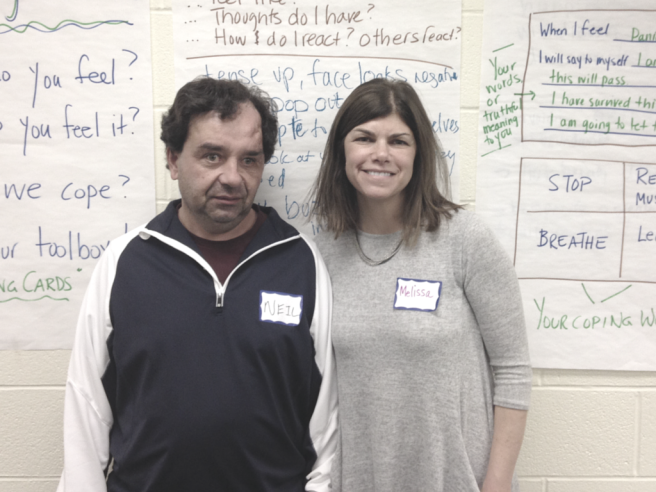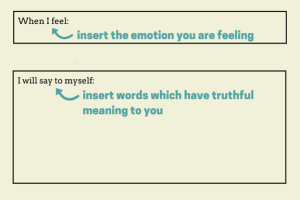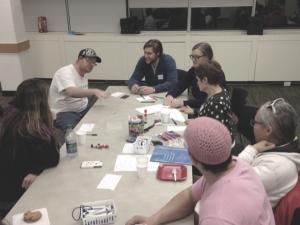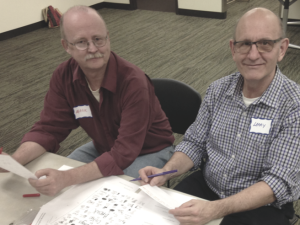
The emotional aspects of living with a brain injury often get lost in all the other challenges, which occur following an ABI. Which is why Melissa Cutler, neurorehabilitation social worker at Bridgepoint Active Healthcare came to our November community meeting to talk about managing emotions after brain injury.
Melissa began her talk by acknowledging that everyone has a different story, and that we are all the experts of our own situation. As such, much of Melissa’s discussion involved input from BIST members.
Since the emotional aspects and challenges of living with brain injury can so often be neglected, we began with a discussion about why we should talk about our emotions after brain injury in the first place. Here are some of the things BIST members discussed:
- Talking leads to accceptance, and acknowledging how I’m different post-ABI
- Sometimes I get agitated, and I want to leave the situation
- My emotions are more on the surface after a brain injury
- There’s less patience, more frustration post-ABI
Eat well, sleep well, feel better
We all have a certain amount of energy. When we are tired, we don’t have the same cognitive abilities as when we are energized. Our ‘filter’ – what keeps us from bluring out anything and everything that’s on our mind- isn’t there to the same extent, and our compulsiveness increases.
All of these traits can be related to brain injury, but factors such as being hungry or being in physical pain can also effect our emotions. When we’re well slept and well nourished it’s easier to manage our emotions. This is something to be mindful of.
What do emotions feel like after an ABI?
BIST members shared their physical and mental feelings associated with emotions:
- Tension builds up, and it’s visible on my face
- My veins pop out
- I begin asking people to repeat themselves
- I get a buzzing feeling in my head
- Dizzy
- Nausea
- Headache
- Foggy
- Can’t find my ‘stop’ button
- Fear – you don’t know what to do or how to deal with it
Members also discussed that brain injury can lead to a lack of emotion. Some emotions, such as sadness, can be particularly hard to feel. Knowing you ‘should’ feel a certain emotion during a specific situation, but that you’re unable to, can be very frustrating.
This is similar to being stuck in a certain emotional space – whether it’s negative or postive. Melissa discussed the need for balance. Negative emotions, she said, are a part of life, but they need to be balanced with positive feelings as well.
BIST members shared that they tend to struggle with the following emotions:
- Discouragement
- Feeling withdrawn
- Feeling a range of emotions, and not being stuck is difficult
What works?
We discussed the following tips to help manage emotions after brain injury:
- Talking about our emotions can get them out of our system
- Try not to let negative comments from others get you down
- Avoid ‘energy pirates’ who rob us of our energy
- Activities such as yoga, meditation, playing cards, bingo, curling, computer games etc. can give us pleasure and lead to a sense of accomplishment
- Sticking to a routine
- Asking for and receiving help
- Getting out and socializing
- Not being alone, not dwelling on the brain injury
- Exercising mind and body
- Helping others can also make you feel good
- Playing and listening to music
Time management and emotions
Many ABI survivors can have a lot of time on their hands, which is something to get used to. Too much time can be a bad thing, and as such, it’s important to keep track of your time and not let it slip away. Members shared that they can feel nervous when they wake up in the morning, not knowing how they’re going to spend their day. Incoporating structure into your daily routine, can not only help you get stuff done, but can also help you emotionally. Knowing what’s expected of you each day can also help with initiation problems which many people living with ABI experience. Here are some tips:
- Mark down your activities for the day, week or month ahead
- Find activities that are meaningful to you (art, exercise, being with an animal)
- It can be help to make an activity list with someone else
- Your list should be specific, for example if you write ‘clean room’ write which room you are cleaning
Importantly, the way you coped before the brain injury may not be accessible or possible right now.
You may have read for hours to escape into a book, or jogged everyday to work out your stress, which are activities that can be impacted by ABI. When brain injury takes away our previous coping mechanisms, it’s important to find new and healthy ones to replace them.
Build our tool box ‘coping cards’
Melissa showed us one way to deal with our emotions, through coping cards. These are simple, portable and personalized to your situation. They are a toolkit to remind ourselves ways to cope when we experience challenging situations and emotions. You can download a sample card HERE, and also see the examples below so you can create your own.
- Sample of a coping card – front
- Sample of a coping card – back
- BIST members create coping cards
- Making coping cards
Next community meeting: January 25th, 2016
Topic: Art Therapy and ABI
Filed under: Community Meetings Tagged: BIST community meeting, Bridgepoint Active Healthcare, managing emotions after brain injury, Melissa Cutler
![]()








